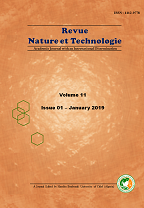Contribution to the domestication of indigenous Fabaceae species of Burundi: Entada abyssinica seedling production
Keywords:
Burundi, Seedling production, Fabaceae, Indigenous species, Reforestation, DomesticationAbstract
In Burundi, species used in reforestation are quasi-exclusively exotic. Indigenous species and their ecosystems are
continuously being degraded due to demographic pressure. It is crucial to domesticate indigenous species particularly
those with socio-economic role such as Fabaceae woody species. This study aims at (i) optimizing seed germination of E. abyssinica, (ii) evaluating the mechanical scarification effect on seedling growth and (iii) seedling growth parameters. We used mechanical and boiling water to scarify E. abyssinica seeds and imbibed at two duration times. Seeds were
germinated at three different temperatures. The results reveal the effectiveness of the mechanical scarification up to
100% germination compared to boiling water, 75% (or non-scarified seeds, 4%) and a quick germination (mean
germination time and time to 50% germination). Deep-scraping on seed hilum differs from a superficial one and
produces excised seed radicles and seedlings with abundant and fasciculate root system. Growth parameters reveal
fastness of E. abyssinica growth approaching one meter per year. The present study concludes that E. abyssinica is a fast-growing species that should be adopted in afforestation, reforestation and ecosystem restoration programs. Further research should investigate field growth parameters of E. abyssinica and pursue domestication trials of other indigenous plant species with high socio-economic and ecological importance.

Downloads
Published
How to Cite
Issue
Section
License
Copyright (c) 2019 Nature & Technology Journal

This work is licensed under a Creative Commons Attribution 4.0 International License.
- All publications of "Nature & Technology Journal" are available under CC-BY Creative Commons Attribution 4.0 International which allows sharing, copying, reproduction, distribution, communication, reuse, adaptation by all means, in all formats and under all licenses.
- Any exploitation of the work or derivative works, including for commercial purposes, is possible. The only obligation is to credit the creators of the authorship of the original works, to indicate the sources and to indicate if modifications were made to the works (obligation of attribution).
This License gives:
- Nature & Technology Journal the right to develop, promote, distribute and archive the article set cited above (including, without limitation, the right to publish the work in whole or in part in any form whatsoever) and ensure the widest dissemination.
- The author (s) reserves the right to use all or part of this article, including tables and figures of his own works, providing that the appropriate recognition is given to the publisher as the holder of the copyrights, and the right to make copies of this article for its own use, but not for sale.



